Social Stratification Assignment: Class, Demographics, and Morbidity
VerifiedAdded on 2022/08/10
|9
|2322
|98
Homework Assignment
AI Summary
This assignment delves into the complexities of social stratification, exploring its multifaceted dimensions. The student begins by defining social stratification, analyzing two primary sociological theories of class: the Marxian and Weberian perspectives. The assignment then evaluates the significance of demographic differences, such as fertility, migration, and mortality, in relation to class inequalities, providing sociological explanations for these differences. Finally, the student discusses the issues that arise when solely attributing morbidity and mortality rates to class position, specifically within the context of the United Kingdom. The analysis highlights the intricate relationship between socioeconomic status, health outcomes, and the limitations of solely relying on class as an indicator, emphasizing the need to consider age and other factors when evaluating health policy agendas.
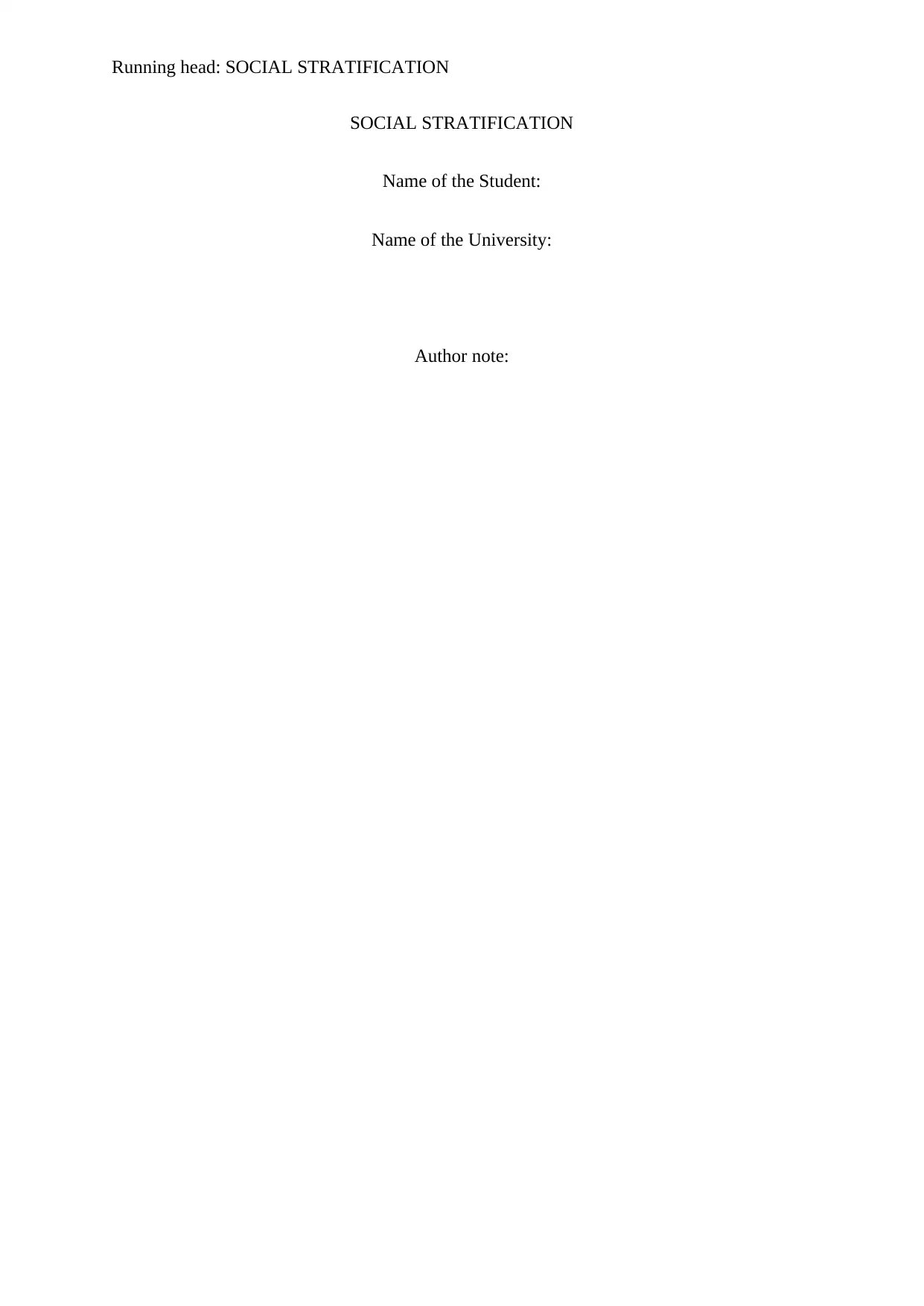
Running head: SOCIAL STRATIFICATION
SOCIAL STRATIFICATION
Name of the Student:
Name of the University:
Author note:
SOCIAL STRATIFICATION
Name of the Student:
Name of the University:
Author note:
Paraphrase This Document
Need a fresh take? Get an instant paraphrase of this document with our AI Paraphraser
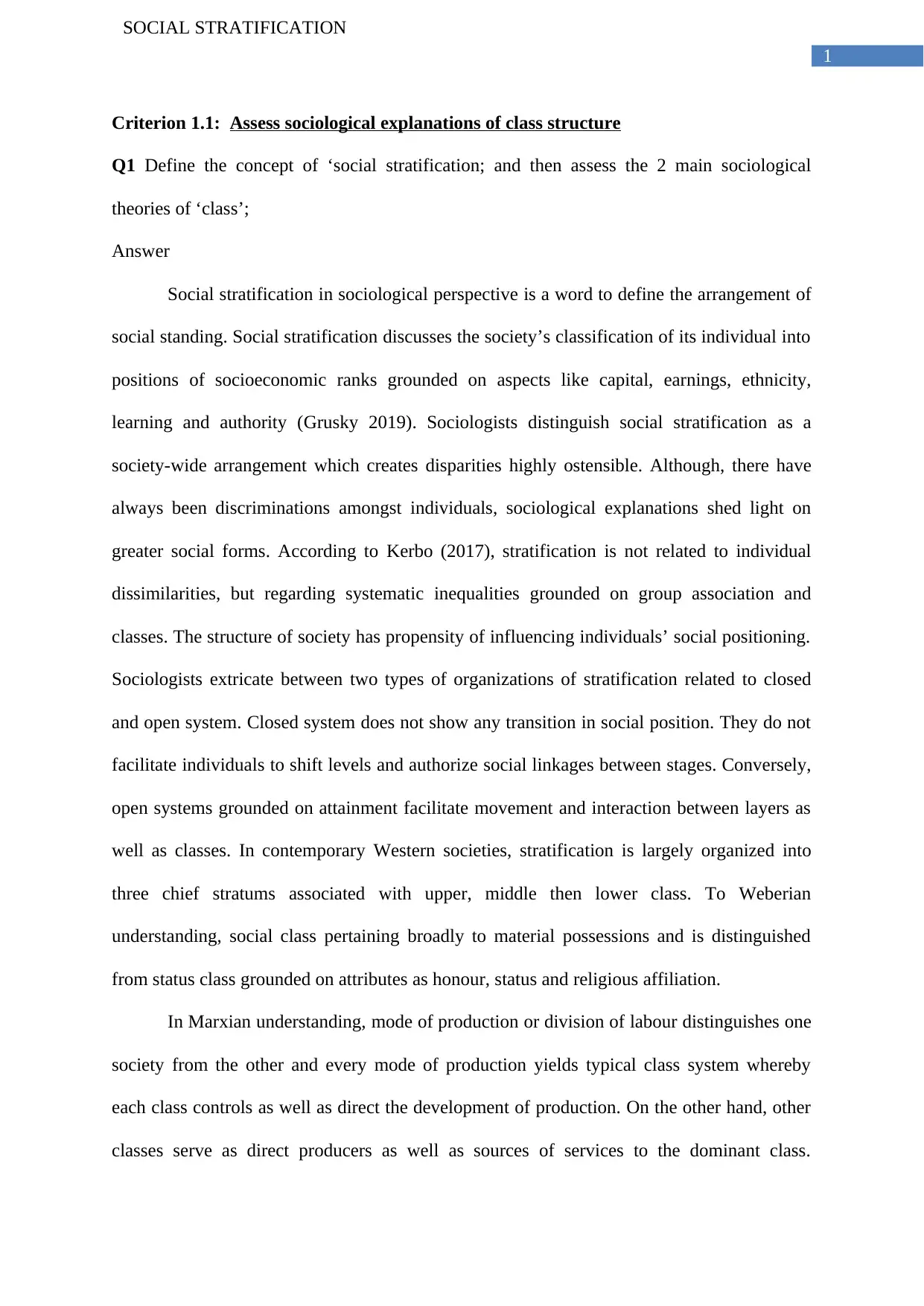
1
SOCIAL STRATIFICATION
Criterion 1.1: Assess sociological explanations of class structure
Q1 Define the concept of ‘social stratification; and then assess the 2 main sociological
theories of ‘class’;
Answer
Social stratification in sociological perspective is a word to define the arrangement of
social standing. Social stratification discusses the society’s classification of its individual into
positions of socioeconomic ranks grounded on aspects like capital, earnings, ethnicity,
learning and authority (Grusky 2019). Sociologists distinguish social stratification as a
society-wide arrangement which creates disparities highly ostensible. Although, there have
always been discriminations amongst individuals, sociological explanations shed light on
greater social forms. According to Kerbo (2017), stratification is not related to individual
dissimilarities, but regarding systematic inequalities grounded on group association and
classes. The structure of society has propensity of influencing individuals’ social positioning.
Sociologists extricate between two types of organizations of stratification related to closed
and open system. Closed system does not show any transition in social position. They do not
facilitate individuals to shift levels and authorize social linkages between stages. Conversely,
open systems grounded on attainment facilitate movement and interaction between layers as
well as classes. In contemporary Western societies, stratification is largely organized into
three chief stratums associated with upper, middle then lower class. To Weberian
understanding, social class pertaining broadly to material possessions and is distinguished
from status class grounded on attributes as honour, status and religious affiliation.
In Marxian understanding, mode of production or division of labour distinguishes one
society from the other and every mode of production yields typical class system whereby
each class controls as well as direct the development of production. On the other hand, other
classes serve as direct producers as well as sources of services to the dominant class.
SOCIAL STRATIFICATION
Criterion 1.1: Assess sociological explanations of class structure
Q1 Define the concept of ‘social stratification; and then assess the 2 main sociological
theories of ‘class’;
Answer
Social stratification in sociological perspective is a word to define the arrangement of
social standing. Social stratification discusses the society’s classification of its individual into
positions of socioeconomic ranks grounded on aspects like capital, earnings, ethnicity,
learning and authority (Grusky 2019). Sociologists distinguish social stratification as a
society-wide arrangement which creates disparities highly ostensible. Although, there have
always been discriminations amongst individuals, sociological explanations shed light on
greater social forms. According to Kerbo (2017), stratification is not related to individual
dissimilarities, but regarding systematic inequalities grounded on group association and
classes. The structure of society has propensity of influencing individuals’ social positioning.
Sociologists extricate between two types of organizations of stratification related to closed
and open system. Closed system does not show any transition in social position. They do not
facilitate individuals to shift levels and authorize social linkages between stages. Conversely,
open systems grounded on attainment facilitate movement and interaction between layers as
well as classes. In contemporary Western societies, stratification is largely organized into
three chief stratums associated with upper, middle then lower class. To Weberian
understanding, social class pertaining broadly to material possessions and is distinguished
from status class grounded on attributes as honour, status and religious affiliation.
In Marxian understanding, mode of production or division of labour distinguishes one
society from the other and every mode of production yields typical class system whereby
each class controls as well as direct the development of production. On the other hand, other
classes serve as direct producers as well as sources of services to the dominant class.
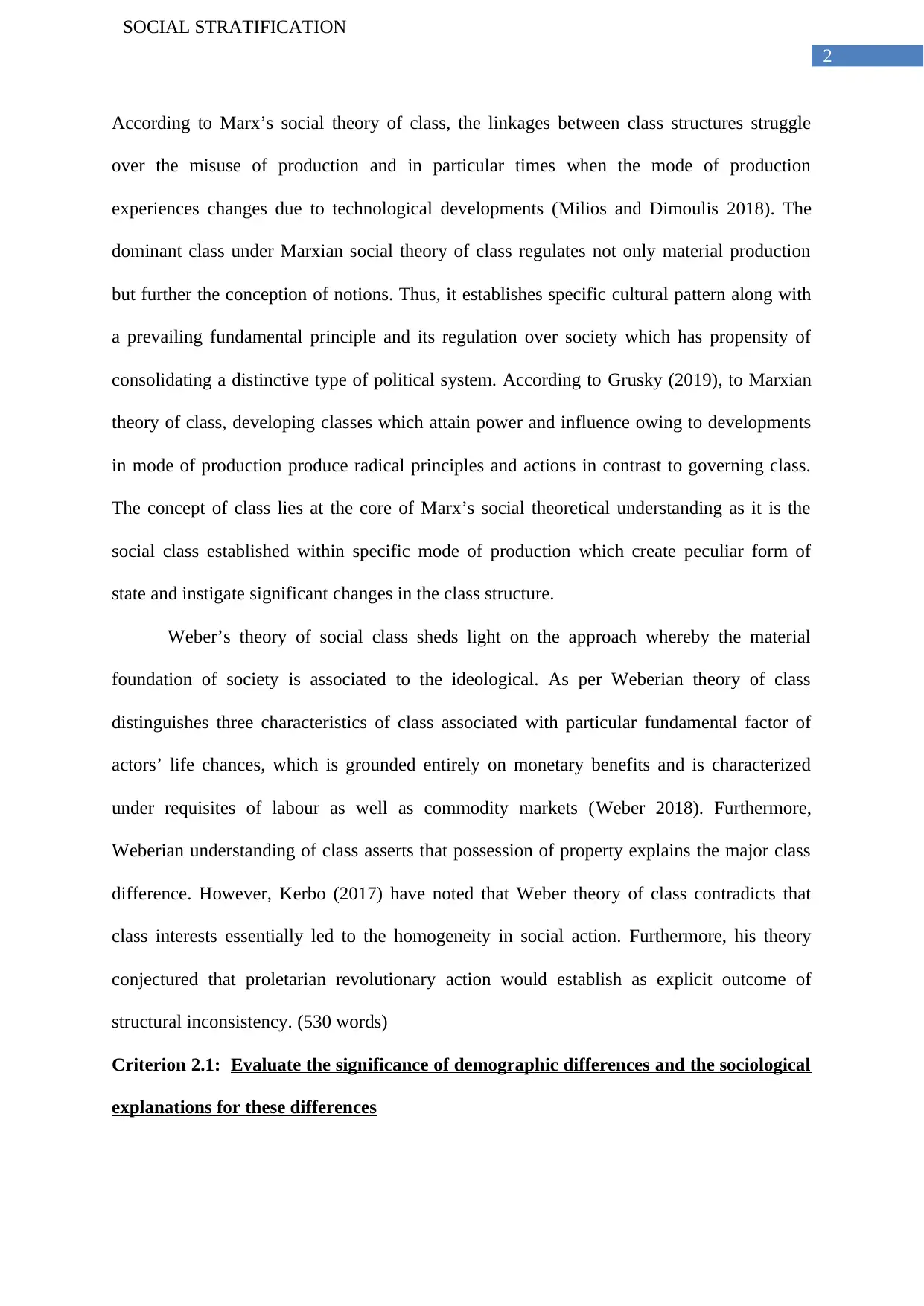
2
SOCIAL STRATIFICATION
According to Marx’s social theory of class, the linkages between class structures struggle
over the misuse of production and in particular times when the mode of production
experiences changes due to technological developments (Milios and Dimoulis 2018). The
dominant class under Marxian social theory of class regulates not only material production
but further the conception of notions. Thus, it establishes specific cultural pattern along with
a prevailing fundamental principle and its regulation over society which has propensity of
consolidating a distinctive type of political system. According to Grusky (2019), to Marxian
theory of class, developing classes which attain power and influence owing to developments
in mode of production produce radical principles and actions in contrast to governing class.
The concept of class lies at the core of Marx’s social theoretical understanding as it is the
social class established within specific mode of production which create peculiar form of
state and instigate significant changes in the class structure.
Weber’s theory of social class sheds light on the approach whereby the material
foundation of society is associated to the ideological. As per Weberian theory of class
distinguishes three characteristics of class associated with particular fundamental factor of
actors’ life chances, which is grounded entirely on monetary benefits and is characterized
under requisites of labour as well as commodity markets (Weber 2018). Furthermore,
Weberian understanding of class asserts that possession of property explains the major class
difference. However, Kerbo (2017) have noted that Weber theory of class contradicts that
class interests essentially led to the homogeneity in social action. Furthermore, his theory
conjectured that proletarian revolutionary action would establish as explicit outcome of
structural inconsistency. (530 words)
Criterion 2.1: Evaluate the significance of demographic differences and the sociological
explanations for these differences
SOCIAL STRATIFICATION
According to Marx’s social theory of class, the linkages between class structures struggle
over the misuse of production and in particular times when the mode of production
experiences changes due to technological developments (Milios and Dimoulis 2018). The
dominant class under Marxian social theory of class regulates not only material production
but further the conception of notions. Thus, it establishes specific cultural pattern along with
a prevailing fundamental principle and its regulation over society which has propensity of
consolidating a distinctive type of political system. According to Grusky (2019), to Marxian
theory of class, developing classes which attain power and influence owing to developments
in mode of production produce radical principles and actions in contrast to governing class.
The concept of class lies at the core of Marx’s social theoretical understanding as it is the
social class established within specific mode of production which create peculiar form of
state and instigate significant changes in the class structure.
Weber’s theory of social class sheds light on the approach whereby the material
foundation of society is associated to the ideological. As per Weberian theory of class
distinguishes three characteristics of class associated with particular fundamental factor of
actors’ life chances, which is grounded entirely on monetary benefits and is characterized
under requisites of labour as well as commodity markets (Weber 2018). Furthermore,
Weberian understanding of class asserts that possession of property explains the major class
difference. However, Kerbo (2017) have noted that Weber theory of class contradicts that
class interests essentially led to the homogeneity in social action. Furthermore, his theory
conjectured that proletarian revolutionary action would establish as explicit outcome of
structural inconsistency. (530 words)
Criterion 2.1: Evaluate the significance of demographic differences and the sociological
explanations for these differences
⊘ This is a preview!⊘
Do you want full access?
Subscribe today to unlock all pages.

Trusted by 1+ million students worldwide
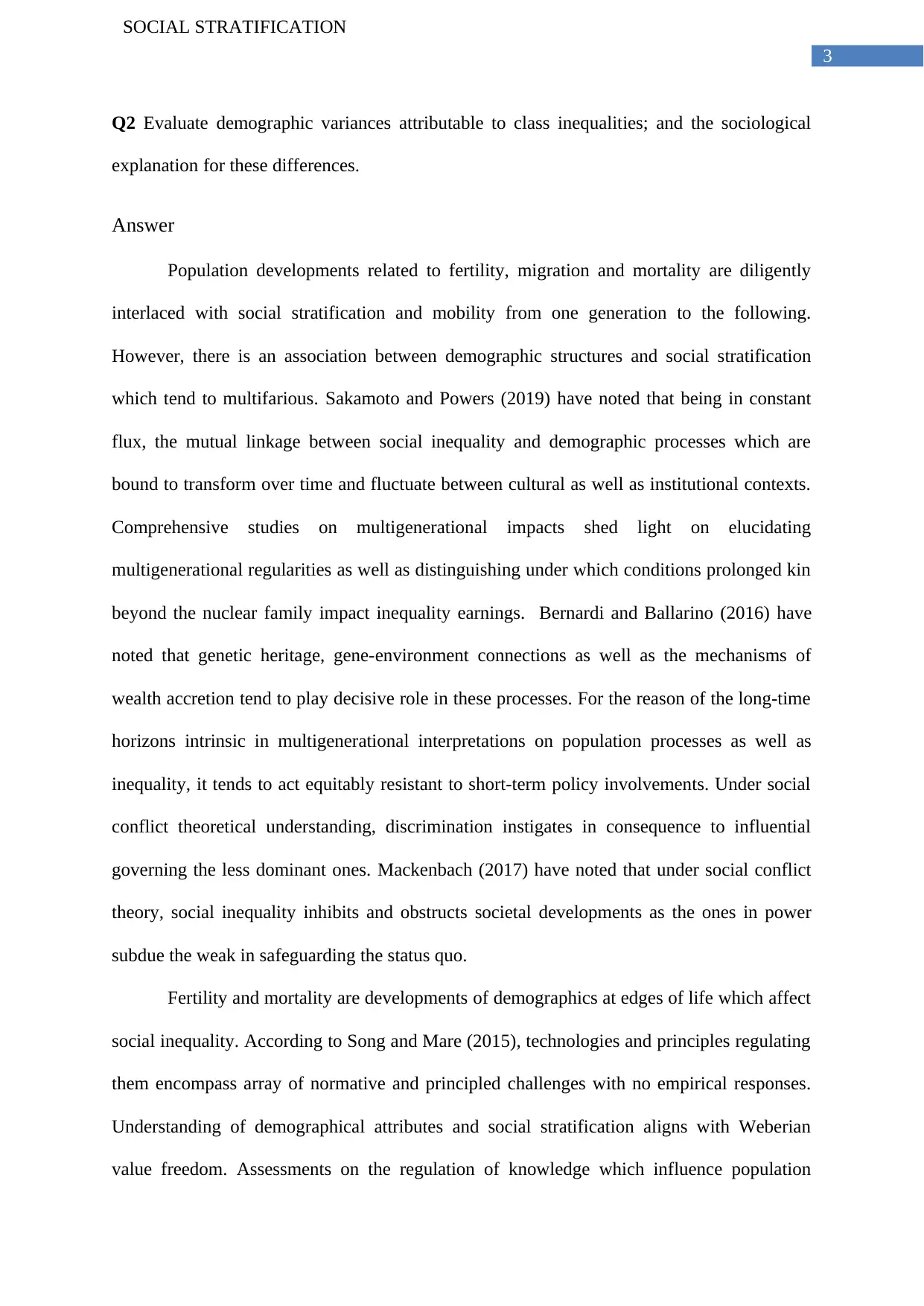
3
SOCIAL STRATIFICATION
Q2 Evaluate demographic variances attributable to class inequalities; and the sociological
explanation for these differences.
Answer
Population developments related to fertility, migration and mortality are diligently
interlaced with social stratification and mobility from one generation to the following.
However, there is an association between demographic structures and social stratification
which tend to multifarious. Sakamoto and Powers (2019) have noted that being in constant
flux, the mutual linkage between social inequality and demographic processes which are
bound to transform over time and fluctuate between cultural as well as institutional contexts.
Comprehensive studies on multigenerational impacts shed light on elucidating
multigenerational regularities as well as distinguishing under which conditions prolonged kin
beyond the nuclear family impact inequality earnings. Bernardi and Ballarino (2016) have
noted that genetic heritage, gene-environment connections as well as the mechanisms of
wealth accretion tend to play decisive role in these processes. For the reason of the long-time
horizons intrinsic in multigenerational interpretations on population processes as well as
inequality, it tends to act equitably resistant to short-term policy involvements. Under social
conflict theoretical understanding, discrimination instigates in consequence to influential
governing the less dominant ones. Mackenbach (2017) have noted that under social conflict
theory, social inequality inhibits and obstructs societal developments as the ones in power
subdue the weak in safeguarding the status quo.
Fertility and mortality are developments of demographics at edges of life which affect
social inequality. According to Song and Mare (2015), technologies and principles regulating
them encompass array of normative and principled challenges with no empirical responses.
Understanding of demographical attributes and social stratification aligns with Weberian
value freedom. Assessments on the regulation of knowledge which influence population
SOCIAL STRATIFICATION
Q2 Evaluate demographic variances attributable to class inequalities; and the sociological
explanation for these differences.
Answer
Population developments related to fertility, migration and mortality are diligently
interlaced with social stratification and mobility from one generation to the following.
However, there is an association between demographic structures and social stratification
which tend to multifarious. Sakamoto and Powers (2019) have noted that being in constant
flux, the mutual linkage between social inequality and demographic processes which are
bound to transform over time and fluctuate between cultural as well as institutional contexts.
Comprehensive studies on multigenerational impacts shed light on elucidating
multigenerational regularities as well as distinguishing under which conditions prolonged kin
beyond the nuclear family impact inequality earnings. Bernardi and Ballarino (2016) have
noted that genetic heritage, gene-environment connections as well as the mechanisms of
wealth accretion tend to play decisive role in these processes. For the reason of the long-time
horizons intrinsic in multigenerational interpretations on population processes as well as
inequality, it tends to act equitably resistant to short-term policy involvements. Under social
conflict theoretical understanding, discrimination instigates in consequence to influential
governing the less dominant ones. Mackenbach (2017) have noted that under social conflict
theory, social inequality inhibits and obstructs societal developments as the ones in power
subdue the weak in safeguarding the status quo.
Fertility and mortality are developments of demographics at edges of life which affect
social inequality. According to Song and Mare (2015), technologies and principles regulating
them encompass array of normative and principled challenges with no empirical responses.
Understanding of demographical attributes and social stratification aligns with Weberian
value freedom. Assessments on the regulation of knowledge which influence population
Paraphrase This Document
Need a fresh take? Get an instant paraphrase of this document with our AI Paraphraser
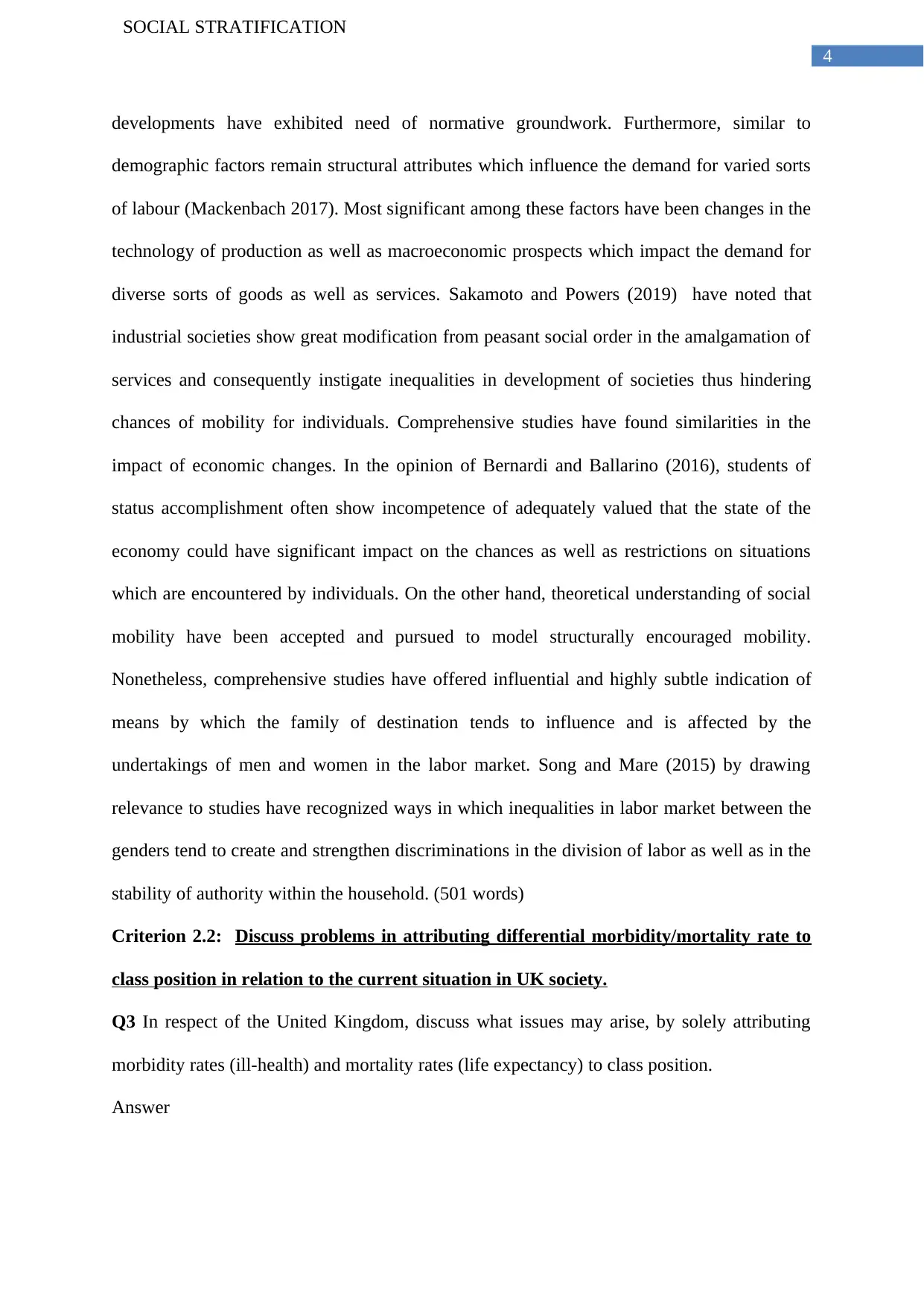
4
SOCIAL STRATIFICATION
developments have exhibited need of normative groundwork. Furthermore, similar to
demographic factors remain structural attributes which influence the demand for varied sorts
of labour (Mackenbach 2017). Most significant among these factors have been changes in the
technology of production as well as macroeconomic prospects which impact the demand for
diverse sorts of goods as well as services. Sakamoto and Powers (2019) have noted that
industrial societies show great modification from peasant social order in the amalgamation of
services and consequently instigate inequalities in development of societies thus hindering
chances of mobility for individuals. Comprehensive studies have found similarities in the
impact of economic changes. In the opinion of Bernardi and Ballarino (2016), students of
status accomplishment often show incompetence of adequately valued that the state of the
economy could have significant impact on the chances as well as restrictions on situations
which are encountered by individuals. On the other hand, theoretical understanding of social
mobility have been accepted and pursued to model structurally encouraged mobility.
Nonetheless, comprehensive studies have offered influential and highly subtle indication of
means by which the family of destination tends to influence and is affected by the
undertakings of men and women in the labor market. Song and Mare (2015) by drawing
relevance to studies have recognized ways in which inequalities in labor market between the
genders tend to create and strengthen discriminations in the division of labor as well as in the
stability of authority within the household. (501 words)
Criterion 2.2: Discuss problems in attributing differential morbidity/mortality rate to
class position in relation to the current situation in UK society.
Q3 In respect of the United Kingdom, discuss what issues may arise, by solely attributing
morbidity rates (ill-health) and mortality rates (life expectancy) to class position.
Answer
SOCIAL STRATIFICATION
developments have exhibited need of normative groundwork. Furthermore, similar to
demographic factors remain structural attributes which influence the demand for varied sorts
of labour (Mackenbach 2017). Most significant among these factors have been changes in the
technology of production as well as macroeconomic prospects which impact the demand for
diverse sorts of goods as well as services. Sakamoto and Powers (2019) have noted that
industrial societies show great modification from peasant social order in the amalgamation of
services and consequently instigate inequalities in development of societies thus hindering
chances of mobility for individuals. Comprehensive studies have found similarities in the
impact of economic changes. In the opinion of Bernardi and Ballarino (2016), students of
status accomplishment often show incompetence of adequately valued that the state of the
economy could have significant impact on the chances as well as restrictions on situations
which are encountered by individuals. On the other hand, theoretical understanding of social
mobility have been accepted and pursued to model structurally encouraged mobility.
Nonetheless, comprehensive studies have offered influential and highly subtle indication of
means by which the family of destination tends to influence and is affected by the
undertakings of men and women in the labor market. Song and Mare (2015) by drawing
relevance to studies have recognized ways in which inequalities in labor market between the
genders tend to create and strengthen discriminations in the division of labor as well as in the
stability of authority within the household. (501 words)
Criterion 2.2: Discuss problems in attributing differential morbidity/mortality rate to
class position in relation to the current situation in UK society.
Q3 In respect of the United Kingdom, discuss what issues may arise, by solely attributing
morbidity rates (ill-health) and mortality rates (life expectancy) to class position.
Answer
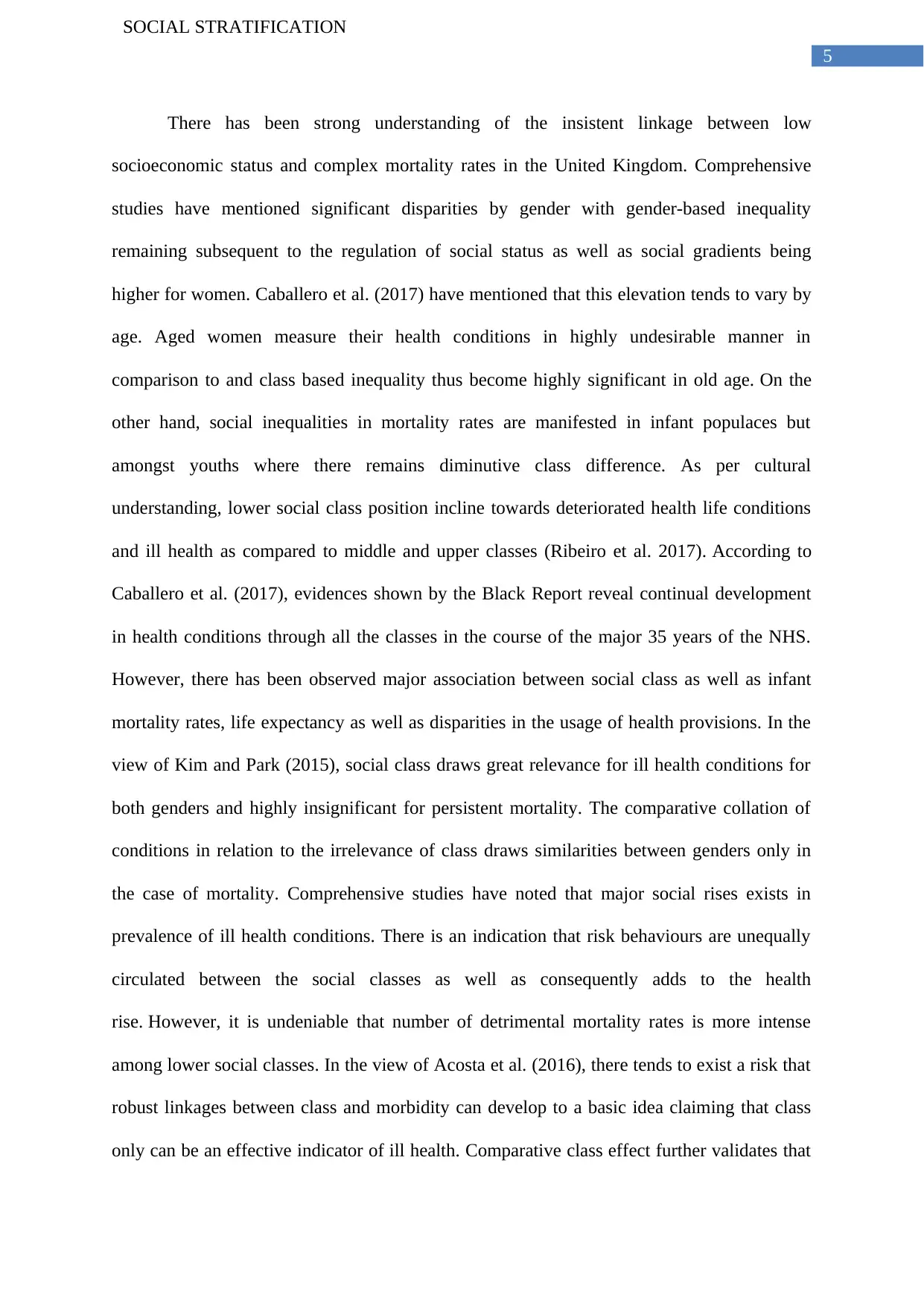
5
SOCIAL STRATIFICATION
There has been strong understanding of the insistent linkage between low
socioeconomic status and complex mortality rates in the United Kingdom. Comprehensive
studies have mentioned significant disparities by gender with gender-based inequality
remaining subsequent to the regulation of social status as well as social gradients being
higher for women. Caballero et al. (2017) have mentioned that this elevation tends to vary by
age. Aged women measure their health conditions in highly undesirable manner in
comparison to and class based inequality thus become highly significant in old age. On the
other hand, social inequalities in mortality rates are manifested in infant populaces but
amongst youths where there remains diminutive class difference. As per cultural
understanding, lower social class position incline towards deteriorated health life conditions
and ill health as compared to middle and upper classes (Ribeiro et al. 2017). According to
Caballero et al. (2017), evidences shown by the Black Report reveal continual development
in health conditions through all the classes in the course of the major 35 years of the NHS.
However, there has been observed major association between social class as well as infant
mortality rates, life expectancy as well as disparities in the usage of health provisions. In the
view of Kim and Park (2015), social class draws great relevance for ill health conditions for
both genders and highly insignificant for persistent mortality. The comparative collation of
conditions in relation to the irrelevance of class draws similarities between genders only in
the case of mortality. Comprehensive studies have noted that major social rises exists in
prevalence of ill health conditions. There is an indication that risk behaviours are unequally
circulated between the social classes as well as consequently adds to the health
rise. However, it is undeniable that number of detrimental mortality rates is more intense
among lower social classes. In the view of Acosta et al. (2016), there tends to exist a risk that
robust linkages between class and morbidity can develop to a basic idea claiming that class
only can be an effective indicator of ill health. Comparative class effect further validates that
SOCIAL STRATIFICATION
There has been strong understanding of the insistent linkage between low
socioeconomic status and complex mortality rates in the United Kingdom. Comprehensive
studies have mentioned significant disparities by gender with gender-based inequality
remaining subsequent to the regulation of social status as well as social gradients being
higher for women. Caballero et al. (2017) have mentioned that this elevation tends to vary by
age. Aged women measure their health conditions in highly undesirable manner in
comparison to and class based inequality thus become highly significant in old age. On the
other hand, social inequalities in mortality rates are manifested in infant populaces but
amongst youths where there remains diminutive class difference. As per cultural
understanding, lower social class position incline towards deteriorated health life conditions
and ill health as compared to middle and upper classes (Ribeiro et al. 2017). According to
Caballero et al. (2017), evidences shown by the Black Report reveal continual development
in health conditions through all the classes in the course of the major 35 years of the NHS.
However, there has been observed major association between social class as well as infant
mortality rates, life expectancy as well as disparities in the usage of health provisions. In the
view of Kim and Park (2015), social class draws great relevance for ill health conditions for
both genders and highly insignificant for persistent mortality. The comparative collation of
conditions in relation to the irrelevance of class draws similarities between genders only in
the case of mortality. Comprehensive studies have noted that major social rises exists in
prevalence of ill health conditions. There is an indication that risk behaviours are unequally
circulated between the social classes as well as consequently adds to the health
rise. However, it is undeniable that number of detrimental mortality rates is more intense
among lower social classes. In the view of Acosta et al. (2016), there tends to exist a risk that
robust linkages between class and morbidity can develop to a basic idea claiming that class
only can be an effective indicator of ill health. Comparative class effect further validates that
⊘ This is a preview!⊘
Do you want full access?
Subscribe today to unlock all pages.

Trusted by 1+ million students worldwide
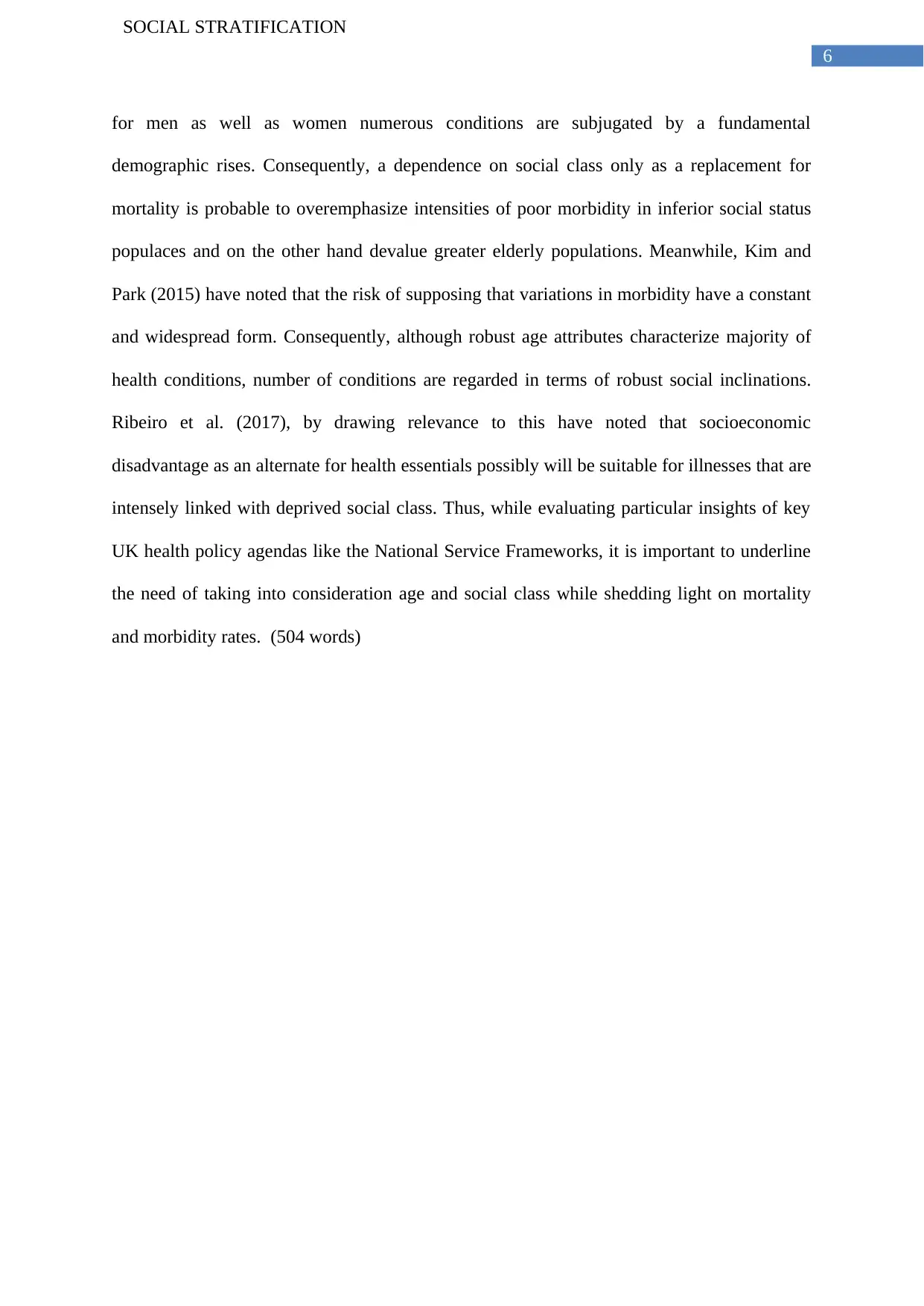
6
SOCIAL STRATIFICATION
for men as well as women numerous conditions are subjugated by a fundamental
demographic rises. Consequently, a dependence on social class only as a replacement for
mortality is probable to overemphasize intensities of poor morbidity in inferior social status
populaces and on the other hand devalue greater elderly populations. Meanwhile, Kim and
Park (2015) have noted that the risk of supposing that variations in morbidity have a constant
and widespread form. Consequently, although robust age attributes characterize majority of
health conditions, number of conditions are regarded in terms of robust social inclinations.
Ribeiro et al. (2017), by drawing relevance to this have noted that socioeconomic
disadvantage as an alternate for health essentials possibly will be suitable for illnesses that are
intensely linked with deprived social class. Thus, while evaluating particular insights of key
UK health policy agendas like the National Service Frameworks, it is important to underline
the need of taking into consideration age and social class while shedding light on mortality
and morbidity rates. (504 words)
SOCIAL STRATIFICATION
for men as well as women numerous conditions are subjugated by a fundamental
demographic rises. Consequently, a dependence on social class only as a replacement for
mortality is probable to overemphasize intensities of poor morbidity in inferior social status
populaces and on the other hand devalue greater elderly populations. Meanwhile, Kim and
Park (2015) have noted that the risk of supposing that variations in morbidity have a constant
and widespread form. Consequently, although robust age attributes characterize majority of
health conditions, number of conditions are regarded in terms of robust social inclinations.
Ribeiro et al. (2017), by drawing relevance to this have noted that socioeconomic
disadvantage as an alternate for health essentials possibly will be suitable for illnesses that are
intensely linked with deprived social class. Thus, while evaluating particular insights of key
UK health policy agendas like the National Service Frameworks, it is important to underline
the need of taking into consideration age and social class while shedding light on mortality
and morbidity rates. (504 words)
Paraphrase This Document
Need a fresh take? Get an instant paraphrase of this document with our AI Paraphraser
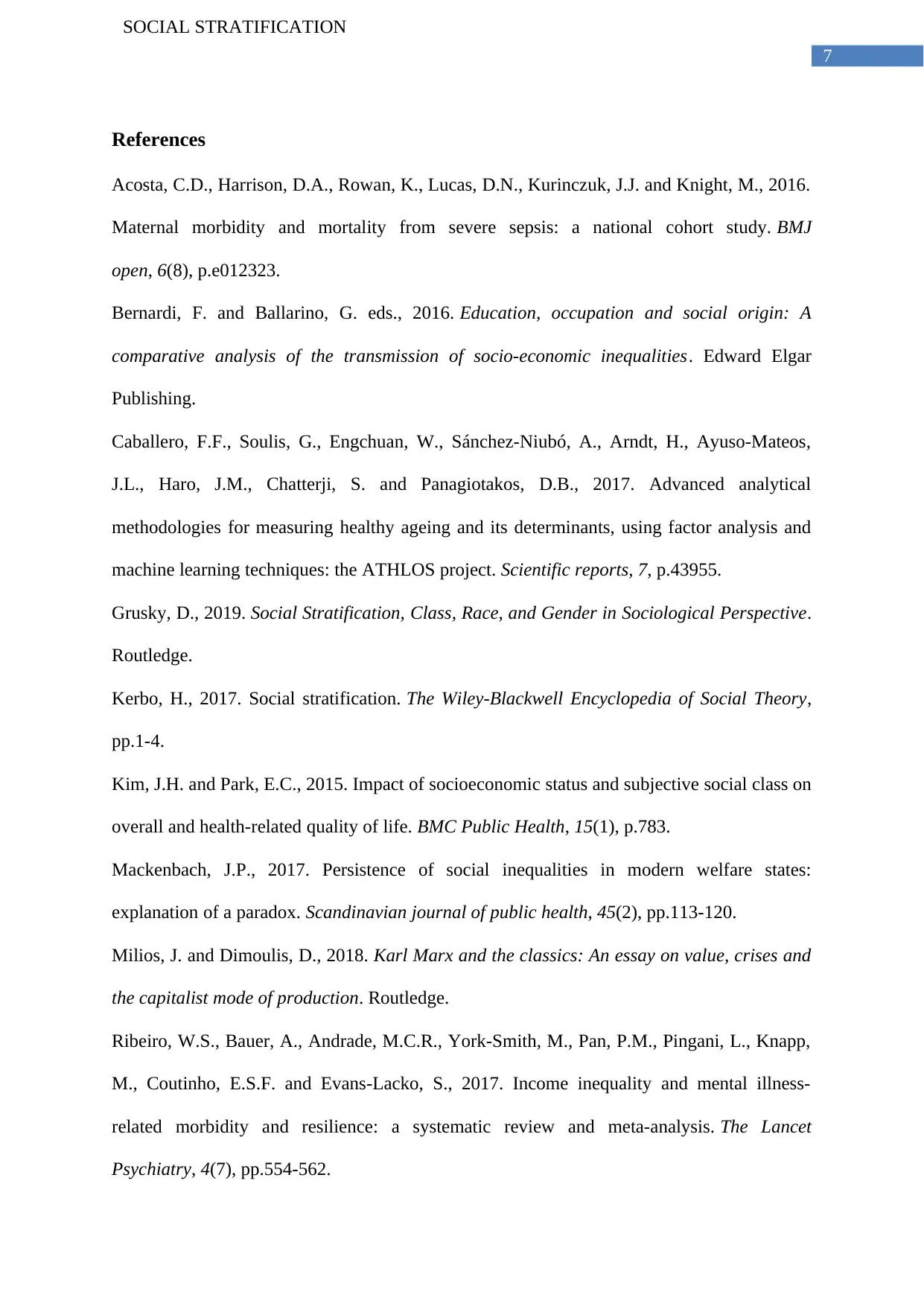
7
SOCIAL STRATIFICATION
References
Acosta, C.D., Harrison, D.A., Rowan, K., Lucas, D.N., Kurinczuk, J.J. and Knight, M., 2016.
Maternal morbidity and mortality from severe sepsis: a national cohort study. BMJ
open, 6(8), p.e012323.
Bernardi, F. and Ballarino, G. eds., 2016. Education, occupation and social origin: A
comparative analysis of the transmission of socio-economic inequalities. Edward Elgar
Publishing.
Caballero, F.F., Soulis, G., Engchuan, W., Sánchez-Niubó, A., Arndt, H., Ayuso-Mateos,
J.L., Haro, J.M., Chatterji, S. and Panagiotakos, D.B., 2017. Advanced analytical
methodologies for measuring healthy ageing and its determinants, using factor analysis and
machine learning techniques: the ATHLOS project. Scientific reports, 7, p.43955.
Grusky, D., 2019. Social Stratification, Class, Race, and Gender in Sociological Perspective.
Routledge.
Kerbo, H., 2017. Social stratification. The Wiley‐Blackwell Encyclopedia of Social Theory,
pp.1-4.
Kim, J.H. and Park, E.C., 2015. Impact of socioeconomic status and subjective social class on
overall and health-related quality of life. BMC Public Health, 15(1), p.783.
Mackenbach, J.P., 2017. Persistence of social inequalities in modern welfare states:
explanation of a paradox. Scandinavian journal of public health, 45(2), pp.113-120.
Milios, J. and Dimoulis, D., 2018. Karl Marx and the classics: An essay on value, crises and
the capitalist mode of production. Routledge.
Ribeiro, W.S., Bauer, A., Andrade, M.C.R., York-Smith, M., Pan, P.M., Pingani, L., Knapp,
M., Coutinho, E.S.F. and Evans-Lacko, S., 2017. Income inequality and mental illness-
related morbidity and resilience: a systematic review and meta-analysis. The Lancet
Psychiatry, 4(7), pp.554-562.
SOCIAL STRATIFICATION
References
Acosta, C.D., Harrison, D.A., Rowan, K., Lucas, D.N., Kurinczuk, J.J. and Knight, M., 2016.
Maternal morbidity and mortality from severe sepsis: a national cohort study. BMJ
open, 6(8), p.e012323.
Bernardi, F. and Ballarino, G. eds., 2016. Education, occupation and social origin: A
comparative analysis of the transmission of socio-economic inequalities. Edward Elgar
Publishing.
Caballero, F.F., Soulis, G., Engchuan, W., Sánchez-Niubó, A., Arndt, H., Ayuso-Mateos,
J.L., Haro, J.M., Chatterji, S. and Panagiotakos, D.B., 2017. Advanced analytical
methodologies for measuring healthy ageing and its determinants, using factor analysis and
machine learning techniques: the ATHLOS project. Scientific reports, 7, p.43955.
Grusky, D., 2019. Social Stratification, Class, Race, and Gender in Sociological Perspective.
Routledge.
Kerbo, H., 2017. Social stratification. The Wiley‐Blackwell Encyclopedia of Social Theory,
pp.1-4.
Kim, J.H. and Park, E.C., 2015. Impact of socioeconomic status and subjective social class on
overall and health-related quality of life. BMC Public Health, 15(1), p.783.
Mackenbach, J.P., 2017. Persistence of social inequalities in modern welfare states:
explanation of a paradox. Scandinavian journal of public health, 45(2), pp.113-120.
Milios, J. and Dimoulis, D., 2018. Karl Marx and the classics: An essay on value, crises and
the capitalist mode of production. Routledge.
Ribeiro, W.S., Bauer, A., Andrade, M.C.R., York-Smith, M., Pan, P.M., Pingani, L., Knapp,
M., Coutinho, E.S.F. and Evans-Lacko, S., 2017. Income inequality and mental illness-
related morbidity and resilience: a systematic review and meta-analysis. The Lancet
Psychiatry, 4(7), pp.554-562.
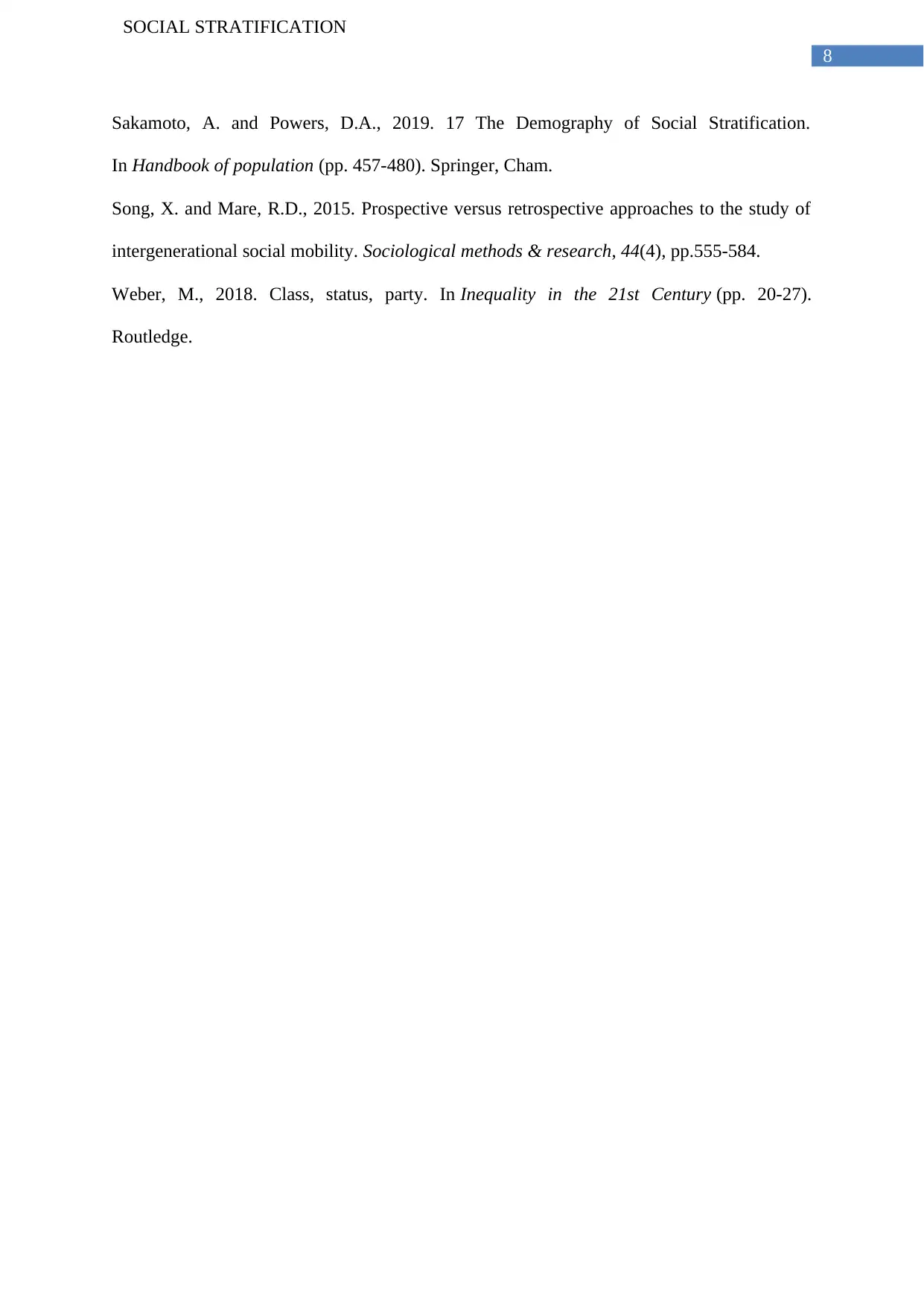
8
SOCIAL STRATIFICATION
Sakamoto, A. and Powers, D.A., 2019. 17 The Demography of Social Stratification.
In Handbook of population (pp. 457-480). Springer, Cham.
Song, X. and Mare, R.D., 2015. Prospective versus retrospective approaches to the study of
intergenerational social mobility. Sociological methods & research, 44(4), pp.555-584.
Weber, M., 2018. Class, status, party. In Inequality in the 21st Century (pp. 20-27).
Routledge.
SOCIAL STRATIFICATION
Sakamoto, A. and Powers, D.A., 2019. 17 The Demography of Social Stratification.
In Handbook of population (pp. 457-480). Springer, Cham.
Song, X. and Mare, R.D., 2015. Prospective versus retrospective approaches to the study of
intergenerational social mobility. Sociological methods & research, 44(4), pp.555-584.
Weber, M., 2018. Class, status, party. In Inequality in the 21st Century (pp. 20-27).
Routledge.
⊘ This is a preview!⊘
Do you want full access?
Subscribe today to unlock all pages.

Trusted by 1+ million students worldwide
1 out of 9
Related Documents
Your All-in-One AI-Powered Toolkit for Academic Success.
+13062052269
info@desklib.com
Available 24*7 on WhatsApp / Email
![[object Object]](/_next/static/media/star-bottom.7253800d.svg)
Unlock your academic potential
Copyright © 2020–2026 A2Z Services. All Rights Reserved. Developed and managed by ZUCOL.




